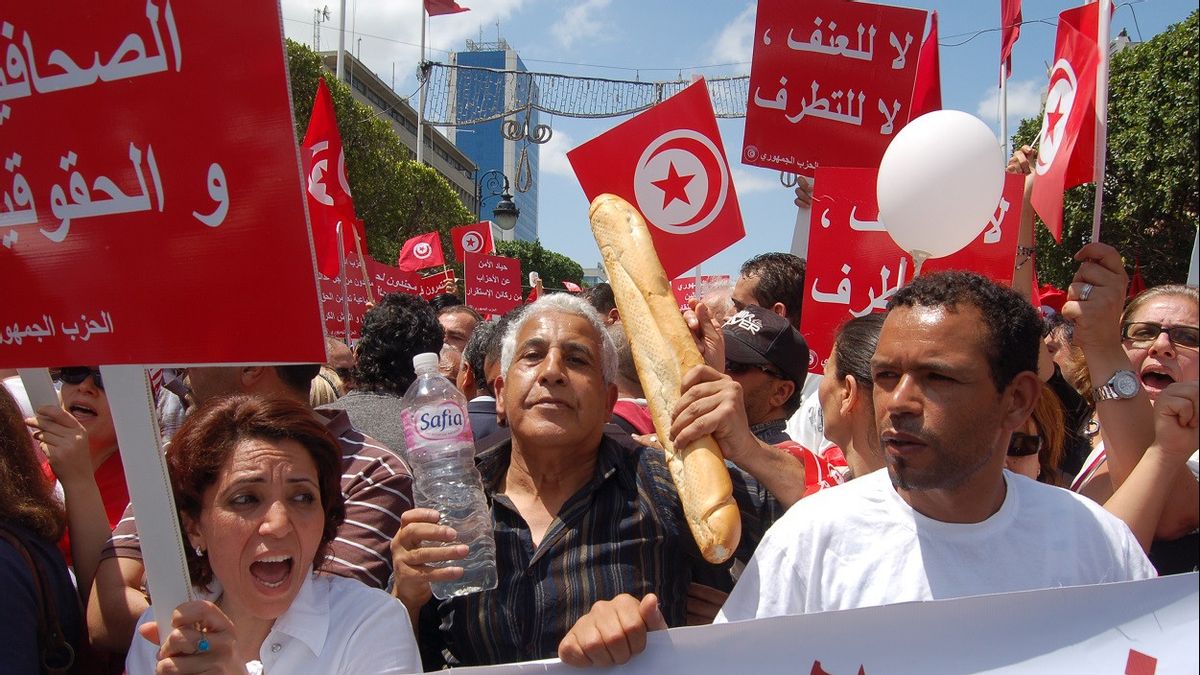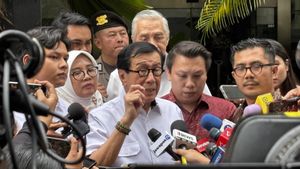JAKARTA - Tunisian President Kaies Saied has dissolved the government and sacked Prime Minister Hichem Mechichi and frozen parliament on Sunday, prompting his supporters to flock to the capital to support his political move, which the opposition sees as a coup.
President Saied said he would take over executive power with the help of a new prime minister, in the biggest challenge to the 2014 democratic constitution that divides power between the president, prime minister, and parliament.
Crowds flooded the capital's streets, cheering and honking car horns inside, reminiscent of the 2011 revolution that brought democracy and sparked the Arab Spring protests that rocked the Middle East.
However, the extent of support for Saied's movement against a fragile government and a divided parliament is unclear, but he warned against responding with violence.
"I warn anyone who thinks of using a gun and anyone who fires a bullet, the armed forces will respond with bullets," he said in a televised statement.

In his statement, Saied said his actions were in line with Article 80 of the Constitution, and also cited the article to suspend the immunity of parliamentarians.
"Many people have been deceived by hypocrisy, treason, and the robbery of people's rights," he said.
Years of paralysis, corruption, declining state services, and rising unemployment all made Tunisia's political conditions worse before the global pandemic hit the economy last year and the rate of coronavirus infections soared this summer.
The protest, which was called by social media activists but not supported by any of the major political parties, took place on Sunday with most of the anger focused on the moderate Islamist party Ennahda, the largest in parliament.
"We have been liberated from them. This is the happiest moment since the revolution," said Lamia Meftahi, a woman celebrating in central Tunis after Saied's remarks, speaking of parliament and the government.
Ennahda, which was outlawed before the revolution, has been the most consistently successful party since 2011 and a member of successive coalition governments.
Its leader Rached Ghannouchi, who is also parliament speaker, immediately called Saied's decision a "coup against the revolution and the constitution" in a phone call with Reuters.
"We consider the institutions still standing, and the Ennahda supporters and the Tunisian people will defend the revolution," he said, raising the prospect of a confrontation between Ennahda and Saied supporters.

The president and parliament were both elected in separate elections in 2019, while Mechichi took office last summer, replacing another short-lived government.
Saied, an independent with no political party behind him, vowed to overhaul a complex political system beset by corruption. Meanwhile, parliamentary elections resulted in a fragmented space, with no party holding more than a quarter of the seats.
Disputes over Tunisia's constitution are meant to be resolved by constitutional courts. However, seven years after the constitution was passed, a court has not yet been established following a dispute over the appointment of judges.
President Saied has been locked in a political feud with Prime Minister Hichem Mechichi for more than a year, as the country grapples with an economic crisis, a looming fiscal crisis, and a failed response to the COVID-19 pandemic.
Under the constitution, the president has direct responsibility only for foreign and military affairs. But, after the government's disaster with a COVID-19 vaccination center got underway last week, he told the army to take responsibility for the pandemic response.
Tunisia's soaring infection and death rates have added to public anger at the government, as the country's political parties clash with each other.
Meanwhile, Mechichi is trying to negotiate a new loan with the International Monetary Fund (IMF) that is seen as crucial to avoiding a looming fiscal crisis, as Tunisia struggles to finance its budget deficit and impending debt payments.
SEE ALSO:
Disputes over economic reforms deemed necessary to secure loans, but which could harm ordinary Tunisians by ending subsidies or cutting public sector jobs, have put the government on the brink of collapse.
The English, Chinese, Japanese, Arabic, and French versions are automatically generated by the AI. So there may still be inaccuracies in translating, please always see Indonesian as our main language. (system supported by DigitalSiber.id)


















